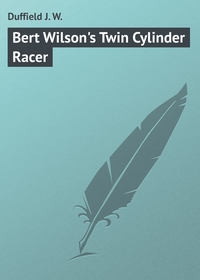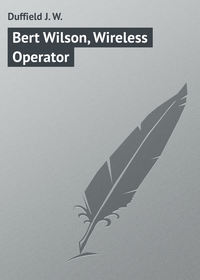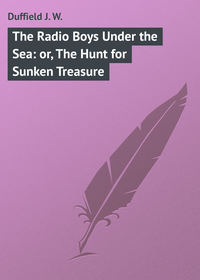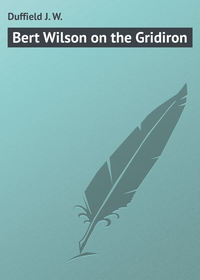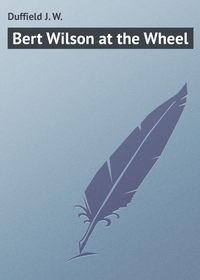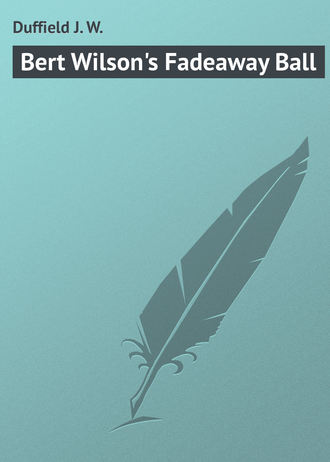 полная версия
полная версияBert Wilson's Fadeaway Ball
His quick eye noticed, in the practice games, how far they came short of his ideal. Flynn, the other day, when he caught that fly far out in center, had hurled it into the plate when he had no earthly chance of getting the runner. If he had tried for Ames, who was legging it to third, it would have been an easy out. A moment later Ames counted on a single.
Then there was that bonehead play, when, with Hinsdale on third and Hodge on first, he had given the signal for Hodge to make a break for second, so as to draw a throw from the catcher and thus let Hinsdale get in from third. Hodge had done his part all right, but Hinsdale had been so slow in starting that the catcher was waiting for him with the ball, when he was still twenty feet from the plate.
He hated to think of that awful moment, when, with the bases full, White had deliberately tried to steal second, where Dick was already roosting. The crestfallen way in which White had come back to the bench, amid ironical cheers and boisterous laughter, was sufficient guarantee that that particular piece of foolishness would never be repeated. Luckily, it had only been in a practice game. Had it happened in a regular contest, a universal roar would have gone up from one end of the college world to the other, and poor White would never have heard the last of it.
The coach was still sore from this special exhibition of “solid ivory,” when, after their bath and rubdown, he called the boys together.
“Now, fellows,” he said, “I am going to talk to you as though you were human beings, and I want you to bring your feeble intelligence to bear, while I try to get inside your brain pans. They say that Providence watches over drunkards, fools and the Congress of the United States. I hope it also includes this bunch of alleged ball players. If ever any aggregation needed special oversight, this crowd of ping-pong players needs it. Now, you candidates for the old ladies’ home, listen to me.”
And listen they did, while he raked them fore and aft and rasped and scorched them, until, when he finally let them go, their faces were flaming. No one else in college could have talked to them that way and “gotten away with it.” But his word was law, his rule absolute, and, behind his bitter tongue, they realized his passion for excellence, his fierce desire of winning. It was sharp medicine, but it acted like a tonic, and every man left the “dissecting room,” as Tom called it, determined from that time on he would play with his brains as well as his muscles.
As the three chums went toward their rooms, they were overtaken by “Reddy,” the trainer of the team. With the easy democracy of the ball field, he fell into step and joined in the conversation.
“Pretty hot stuff the old man gave you, just now,” he said, with his eyes twinkling.
“Right you are,” replied Bert, “but I guess we deserved it. I don’t wonder that he was on edge. It certainly was some pretty raw baseball he saw played to-day.”
“Sure,” assented Reddy, frankly. “It almost went the limit. And yet,” he went on consolingly, “it might have been worse. He only tried to steal one base with a man already on it. Suppose he’d tried to steal three.”
The boys laughed. Reddy was a privileged character about the college. The shock of fiery hair, from which he had gained his nickname, covered a shrewd, if uneducated, mind. He had formerly been a big league star, but had fractured an ankle in sliding to second. The accident had only left a slight limp, but it had effectually destroyed his usefulness on the diamond. As a trainer and rubber, however, he was a wonder, and for many years he had been connected with the college in that capacity. It was up to him to keep the men in first-class condition, and he prided himself on his skill. No “charlie horse” could long withstand his ministrations, and for strains and sprains of every kind he was famous in the athletic world. His interest in and loyalty to the college was almost as great as that of the students themselves. He was in the full confidence of the coach, and was regarded by the latter as his right hand. If one was the captain of the college craft, the other was the first mate, and between them they made a strong combination. He was an encyclopedia of information on the national game. He knew the batting and fielding averages of all the stars for many years past, and his shrewd comments on men and things made him a most interesting companion. His knowledge of books might be limited, but his knowledge of the world was immense. He had taken quite a fancy to Bert and shared the conviction of the coach that he was going to be a tower of strength to the team. He never missed an opportunity of giving him pointers, and Bert had profited greatly by his advice and suggestion. Now, as they walked, he freed his mind along the same lines followed by the coach a little earlier.
“That was the right dope that Ainslee gave you, even if it was mixed with a little tabasco,” he said. “It’s the ‘inside stuff’ that counts. I’d rather have a team of quick thinkers than the heaviest sluggers in the league.
“Why,” he went on, warming to his subject, “look at the Phillies when Ed Delehanty, the greatest natural hitter that ever lived, was in his prime. Say, I saw that fellow once make four home runs in one game against Terry of the Brooklyns. I don’t suppose that a heavier batting bunch ever existed than the one they had in the league for three seasons, handrunning. Besides Ed himself, there was Flick and Lajoie, and a lot of others of the same kind, every one of them fence-breakers. You couldn’t blame any pitcher for having palpitation of the heart when he faced that gang. They were no slouches in the field, either. Now, you’d naturally think that nobody would have a chance against them. Every year the papers touted them to win the pennant, but every year, just the same, they came in third or fourth at the end of the season. Now, why was it they didn’t cop the flag? I’ll tell you why. It was because every man was playing for himself. He was looking out for his record. Every time a man came to the bat, he’d try to lose the ball over the back fence. They wouldn’t bunt, they wouldn’t sacrifice, they wouldn’t do anything that might hurt that precious record of theirs. It was every man for himself and no man for the team, and they didn’t have a manager at the head of them that was wise enough or strong enough to make them do as they were told.
“Now, on the other hand, look at the White Sox. Dandy fielders, but for batting – why, if they fell in the river they wouldn’t strike the water. All around the league circuit, they were dubbed the ‘Hitless Wonders.’ But they were quick as cats on their feet, and just as quick in knowing what to do at any stage of the game. What hits they did get counted double. They didn’t get men on the bases as often as the Phillies, but they got them home oftener, and that’s what counts when the score is added up. That sly old fox, Comiskey, didn’t miss a point. It was a bunt or a sacrifice or a long fly to the outfield or waiting for a base on balls or anything else he wanted. The men forgot about themselves and only thought of the team, and those same ‘Hitless Wonders’ won the pennant in a walk.
“Now, that’s just the difference between dumb and brainy playing and that’s what makes Ainslee so hot when he sees a bonehead stunt like that one this afternoon.”
“I suppose that you saw no end of that inside stuff pulled off while you were in the big league,” said Tom. “What do you think is the brightest bit of thinking you ever saw on the ball field?”
“Well,” said Reddy musingly, “that’s hard to tell. I’ve certainly seen some stunts on the diamond that would make your hair curl. Some of them went through, and others were good enough to go through, even if they didn’t. It often depends on the way the umpire looks at it. And very often it gets by, because the umpire doesn’t look at it at all. Many’s the time I’ve seen Mike Kelly of the old Chicagos – the receiving end of the ten-thousand-dollar battery – cut the corners at third when the umpire wasn’t looking, and once I saw him come straight across the diamond from second to the plate without even making a bluff of going to third. Oh, he was a bird, was Mike.
“I shall never forget one day when the Chicagos were behind until they came to the plate for their ninth inning. They were a husky bunch of swatters and never more dangerous than when they were behind. Well, they made two runs in that inning, tieing the score and then putting themselves one to the good. The Bostons came in for their last turn at the bat and by the time two men were out they had the bases full. One safe hit to the outfield was all they needed, and they sent a pinch-hitter to the bat to bring in the fellows that were dancing about on the bases.
“It was a dreary, misty afternoon, and, from the grandstand you could hardly see the fielders. Mike was playing right that day, and the man at the bat sent a screaming liner out in his direction. He saw at a glance that he couldn’t possibly get his hands on it, but he turned around and ran with the ball, and, at the last moment, jumped into the air and apparently collared it. He waved his hands as a signal that he had it and made off to the clubhouse. The umpire called the batter out and the game was over. His own teammates hadn’t tumbled to the trick, until Mike told them that he hadn’t come anywhere near the ball, and that at that very moment it was somewhere out on the playing field. It came out later, and there was some talk of protesting the game, but nothing ever came of it. When it came to quick work, Mike was certainly ‘all wool and a yard wide.’”
The boys did not express an opinion as to the moral quality of the trick, and Reddy went on:
“Perhaps the slickest thing I ever saw was one that Connie Mack put over on old Cap Anson of the Chicagos, and, believe me, anybody who could fool him was going some. His playing days are over now, and all you kids know of him is by reputation, but, take him by and large, a better player never pulled on a glove. Well, as I was saying, Anson was playing one day in Pittsburgh and Mack was catching against him. It had been a game of hammer and tongs right up to the last inning. The Chicagos, as the visiting team, came to the bat first in the ninth inning. The Pittsburghs were one ahead and all they needed to win was to hold the Chicagos scoreless. Two were out and two on bases when old ‘Pop’ Anson came to the bat. There wasn’t a man in the league at that time that a pitcher wouldn’t rather have seen facing him than the ‘Big Swede.’ However, there was no help for it, and the twirler put on extra steam and managed to get two strikes on him. The old man set himself for the third, with fierce determination to ‘kill’ the ball or die in the attempt. Mack walked up to the pitcher and told him to send in a ball next time, and then, the instant the ball was returned to him, to put over a strike. The pitcher did as directed, and sent over a wide one. Of course, Anson didn’t offer to hit it, but Mack caught it.
“‘Third strike,’ he said, throwing off his mask and shin-guards, as though the game were over.
“‘Third strike nothing,’ growled Anson. ‘What’s the matter with you, anyway?’ and the umpire also motioned Connie back to the plate.
“‘Why, wasn’t that a strike?’ said Mack, coming back to the plate. At the same instant the pitcher sent a beauty right over the center of the rubber. Mack caught it, and before Anson knew the ball had been pitched, the umpire said, ‘You’re out.’
“Holler? Say, you could have heard him from Pittsburgh to Chicago. It went, though. You see, Anson, looking at Connie without his mask or shin-guards, was figuring that he would have to get into all that harness again, before the game went on. He took too much for granted, and it doesn’t pay to do that in baseball. I don’t suppose he ever forgave Connie for making him look like thirty cents before that holiday crowd. And I don’t suppose that Mack would have taken a thousand dollars for the satisfaction it gave him to tally one on the old man.
“You fellows wouldn’t believe me, I suppose, if I told you I seen a dog pull some of that inside stuff once? Sure, I ain’t fooling, although of course the pup didn’t know he was doing it. It was in Detroit when a big game was on and the home team was at the bat. They needed three runs to win and there were two men on bases. The batter lined out a peach between left and center. There were no automobiles in those days, but a whole raft of carriages were down back of center field. A big coach dog saw the ball coming and chased it, got it in his mouth and scooted down under the bleachers, the left and center fielders yelling to him to drop it and racing after him like mad. He was a good old rooter for the home team, all right, though, and, by the time they got it away from him, the whole bunch had crossed the plate and the game was won. The home team boys found out whom he belonged to, and clubbed together and got him a handsome collar.
“Another funny thing I seen one time that makes me laugh whenever I think of it,” continued Reddy, “was when a high fly was hit to left field with three men on bases. It ought to have been an easy out and nine times out of ten would have been. But, as luck would have it, the ball slipped through the fielder’s fingers and went into the outside upper pocket of his baseball shirt. He tried desperately to get it out, but it was wedged in so tight he couldn’t. All this time the men were legging it around the bases. At last, Mitchell – that was the fellow’s name – ran in toward third and caught the batter, just as he was rounding the base on his way to home. He grabbed him and hugged him tight and they fell to the ground together. Say, you’d have died laughing if you’d seen them two fellows wrestling, Mitchell trying to force the other man’s hand into his pocket so that the ball could touch him, and the other fighting to keep his hand out. It was a hard thing for the umpire to settle, but he finally let the run count on the ground that Mitchell had no right to interfere with him. Poor old Mitchell was certainly up against it that day, good and plenty.”
By this time they had reached the college dormitory, and the boys reluctantly bade Reddy good-by. They had been immensely amused and interested by his anecdotes, although they did not altogether agree with his easy philosophy of life. To Reddy all was fair in love or war or baseball, provided you could “put it over.”
“But it isn’t,” said Bert, as they went upstairs. “Strategy is one thing and cheating is another. It’s all right to take your opponent unawares and take advantage of his carelessness or oversight. If he’s slow and you’re quick, if he’s asleep and you’re awake, you’ve got a perfect right to profit by it. Now take for instance that case of Mack and Anson. Whether that was a strike or a ball was a thing to be decided by the umpire alone, and Anson ought not to have paid any attention to Mack’s bluff. Then, too, because Mack usually put on his mask and shin-guards before the ball was pitched, Anson had no right to assume that he would always do so. Mack acted perfectly within his rights, and Anson was simply caught napping and had no kick coming.
“But when you come to ‘cutting the corners’ and pretending that the ball was caught when it wasn’t, that isn’t straight goods. It’s ‘slick,’ all right, but it is the slickness of the crooked gambler and the three-card monte man. It’s playing with marked cards and loaded dice, and I don’t care for any of it in mine.”
“Right you are, old fellow,” said Tom, heartily, clapping him on the back, “my sentiments to a dot. I want to win and hate to lose, but I’d rather lose a game any day than lie or cheat about it.”
Which he was to prove sooner than he expected.
CHAPTER IV
The Triple Play
The days flew rapidly by and the time drew near for the Spring trip. All the members of the team were to get a thorough trying out in actual games with the crack teams of various colleges before the regular pennant race began. Then the “weeding out” process would have been completed, and only those remain on the team who had stood the test satisfactorily. The trip was to take about two weeks, and they were to “swing around the circle” as far west as Cincinnati and as far south as Washington.
They did not expect much trouble in coming back with a clean score. As one of the “Big Three,” their team was rarely taken into camp by any of the smaller colleges. They usually won, occasionally tied, but very seldom lost. Yet, once in a while, their “well-laid schemes” “went agley” and they met with a surprise party from some husky team that faced them unafraid and refused to be cowed by their reputation.
Bert’s college was one of the largest and most important in the country. The “Big Three” formed a triangular league by themselves alone. Each played three games with each of the other two, and the winner of the majority was entitled to claim the championship of the “Big Three.” And it was generally, though not officially, admitted, that the team capable of such a feat was the greatest college baseball team in the whole country. Their games were followed by the papers with the greatest interest and fully reported. The “Blues,” as Bert’s college was usually referred to on account of the college colors, had won the pennant the year before from the “Grays” and the “Maroons,” their traditional opponents, after a heart-breaking struggle, and columns of newspaper space had been devoted to the concluding game. This year, however, the prediction had been freely made that history would not repeat itself. Both the Grays and Maroons were composed of tried and tested veterans, while, as we have seen, Ainslee had been compelled to fill several important positions with new material. No matter how good this might prove to be, it takes time and practice to weld it together in one smooth machine, and it is seldom done in a single season.
Moreover, the time was at hand when Ainslee would have to rejoin his own team, and his keen eye still noted a number of rough places that needed planing and polishing. For this reason he was all the more anxious to secure good results during this trip. After it was over, he would have to turn over the team to a manager and to Reddy, the assistant coach and trainer. The manager would confine himself chiefly to the technical and financial features, but it was arranged that Reddy should have full charge of the team on the field. Ainslee reposed implicit confidence in him because of his shrewd judgment, his knowledge of men, and his vast baseball experience.
West Point was to be their first stop, and it was a jolly crowd, full of the joy and zest of living, that embarked on the steamer Hendrik Hudson, and sailed up the lordly river, the finest in the world, as most of the boys agreed, though some, who had traveled, were inclined to favor the claims of the Rhine to that distinction. They were disposed to envy the Dutch explorer, who, first among civilized men, had sailed up the river that bore his name and feasted his eyes upon its incomparable beauty; a delight that contrasted so strongly with the final scene when he and his little son had been thrust by a mutinous crew into an open boat on storm-tossed Arctic waters, and left to perish miserably. The reward, as Dick cynically insisted, of most of the world’s great benefactors, who have been stoned, burned, or otherwise slain by their fellows, while posterity, too late, has crowned them with laurels and honored them with monuments.
The game with Uncle Sam’s cadets was a fight “for blood,” as was entirely appropriate for future soldiers. In the seventh, with the cadets one run behind, one of them attempted to steal from second to third. Hinsdale got the ball down to Tom like a shot, but, in the mix-up, it was hard to tell whether the runner had made the base or not. The umpire at first called it out, but the captain of the cadets kicked so vigorously that the umpire asked Tom directly whether he had touched him in time.
For an instant Tom hesitated, but only for an instant. Then he straightened up and answered frankly:
“No, I didn’t; he just beat me to it.”
It is only just to Tom’s companions to say that, after the first minute of disappointment, they felt that he could and should have done nothing else. The standard of college honor is high, and when it came to a direct issue, few, if any, of the boys would have acted differently. Even Reddy, with his free and easy views on winning games “by hook or crook,” as long as you win them, felt a heightened respect for Tom, although he shook his head dubiously when the man from third came home on a sacrifice, tieing the score.
The tie still persisted in the ninth, and the game went into extra innings. In the tenth the Blues scored a run and the cadets made a gallant effort to do the same, or even “go them one better.” A man was on second and another on third, when one of their huskiest batters came to the plate. He caught the ball squarely “on the seam” and sent it straight toward third, about two feet over Tom’s head. He made a tremendous jump, reached up his gloved hand and the ball stuck there. That of course put out the batter. The man on third, thinking it was a sure hit, was racing to the plate. As Tom came down, he landed right on the bag, thus putting out the runner, who had turned and was desperately trying to get back. In the meantime the man on second, who had taken a big lead, had neared third. As he turned to go back to second, Tom chased him and touched him just before he reached the bag. Three men were out, the game was won, and Tom was generously cheered, even by the enemy, while his comrades went wild. He had made a “triple play unassisted,” the dream of every player and one of the rarest feats ever “pulled off” on the baseball diamond.
During the trip, Winters and Benson occupied the pitcher’s box more often than Bert, and it was evident that, despite Bert’s showing in the early spring practice, both Ainslee and Reddy were more inclined to pin their faith this season on their tested stars than on the new recruit. They really believed that Bert had “more on the ball” than either of the others, but were inclined to let him have a year on the bench before putting him in for the “big” games. They knew the tremendous importance of experience and they also knew how nerve-racking was the strain of playing before a crowd of perhaps twenty-five thousand frenzied rooters. Bert might do this, but Winters and Benson had actually done it, and they could not leave this significant fact out of their calculations. So they carried him along gradually, never letting up on their instruction and advice and occasionally putting him in to pitch one or two innings to relieve the older men after the game was pretty surely won.
Bert was too sensible and sportsmanlike to resent this, and followed with care and enthusiasm the training of his mentors. A better pair of teachers could not have been found and Bert made rapid progress. Something new was constantly coming up, and, as he confided to Dick, he never dreamed there was such a variety of curves. There was “the hook,” “the knuckle,” “the palm,” “the high floater,” “the thumb jump,” “the cross fire,” and so many others that there seemed to be no end to them. But though he sought to add them all to his repertory, he followed Ainslee’s earnest urging to perfect his wonderful fadeaway, and gave more attention to that than to any other.
“And to think,” he said to Tom, one day, “it isn’t so very long ago that people didn’t believe it was possible to throw a curve ball at all and learned men wrote articles to show that it couldn’t be done.”
“Yes,” said Tom, “they remind me of the eminent scientist who wrote a book proving, to his own satisfaction, at least, that a vessel couldn’t cross the Atlantic under steam. But the first copy of the book that reached America was brought over by a steamer.”
“Yes,” chimed in Dick, “they were like the farmer who had read the description of a giraffe and thought it a fairy story. One day a circus came to town with a giraffe as one of its attractions. The farmer walked all around it, and then, turning to his friends, said stubbornly, ‘There ain’t no such animal.’”
Reddy joined in the laugh that followed and took up the conversation. “Well,” he said, while the others in the Pullman car in which they were traveling drew around him, for they always liked to see him get started on his recollections, “the honor of having discovered the curve rests between Arthur Cummings and Bobby Mathews. It’s never been clearly settled which ‘saw it first.’ Before their time it used to be straight, fast ones and a slow teaser that was thrown underhand. But even at that, don’t run away with the idea that those old fellows weren’t some pitchers. Of course, they were handicapped by the fact that at first they had to keep on pitching until the player hit it. The four-ball rule, and making a foul count for a hit, and all those modern things that have been invented to help the pitcher, hadn’t been thought of then. Naturally, that made heavy batting games. Why, I know that the old Niagara team of Buffalo won a game once by 201 to 11.”


